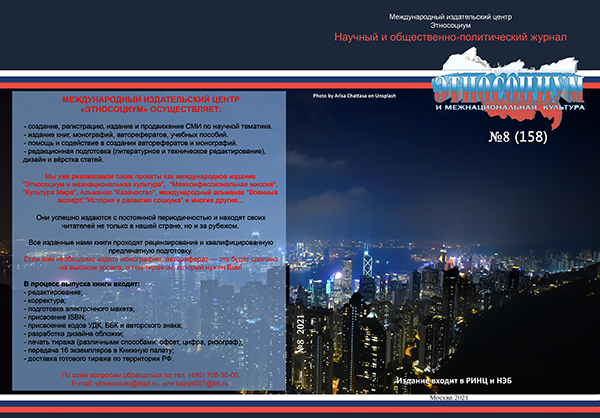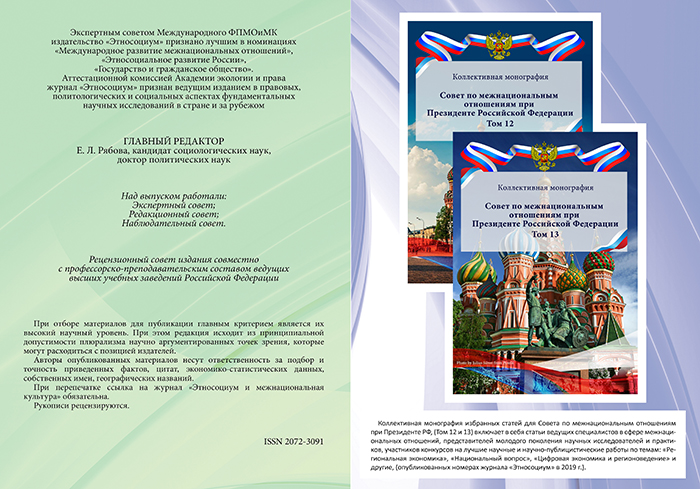

Content
|
ACTUAL PROBLEMS OF MODERN SOCIETY
|
|
|
Ryabova E.I., Ternovaya L.O. The phenomenon of satirical parties and whether they have a future
|
9
|
|
Kretov S.M. The General Approaches to the Interpretation of the Concept of “Nation- and State-Building”
|
20
|
|
INTERNATIONAL RELATIONSHIPS
|
|
|
Mikhailova N.V., Amiantova I.S., Nikoloz Bitsadze Gender politics as factor of political stability in the Islamic Republic of Afghanistan
|
31
|
|
Bajora A.F. To the question about the formation of Gagauz ethnos and their ethnonym
|
46
|
|
Zhang Liwei Linguistic competition of the leading powers in Tajikistan in terms of cultural “soft power”
|
58
|
|
Daaev A.N., Ternovaya L.O. Hybrid sport transformation: less athletics and more politics
|
81
|
|
Morozov Yu.A., Wang Pinke, Suzdaleva T.R. “Cultural Revolution” in China: the view of Chinese and Russian researchers
|
89
|
|
SOCIOLOGICAL SCIENCES
|
|
|
Shinkarenko V.D. The limits of the development of world capitalism
|
97
|
|
ECONOMIC SCIENCES
|
|
|
Trophimova N.N. The need to improve the digital literacy of business leaders in the context of the systemic COVID-crisis
|
119
|
|
REVIEW
|
|
|
Zhang Xiaoling Traditional Chinese tea culture in a new perspective
|
128
|
|
Ouyang Meihe Conversation with masters of Chinese culture on the topic of tea culture in time and space
|
135
|
|
Abstracts
|
139
|
|
Authors
|
150
|
|
Requirements to materials submitted to the international publishing house "Etnosocium"
|
153
|
In the political life of different states and at different stages of their development, a similar phenomenon arises, consisting in the formation of parties of not just a laugh, but a clearly expressed satirical type. The history of such parties is more than a hundred years old and comes from the creation of the "Party of Moderate Progress within the Law" by the Czech writer Jaroslav Hasek. The emergence of such political structures can be a response to foreign policy challenges, when the ruling party does not adequately assess its own geopolitical capabilities. Often it is a response to internal political problems that cannot be resolved within the framework of the existing party model. The use of satirical parties is similar to the use of satire, which can make people think about their personal responsibility not only for their lives, but also for the fate of the state.
Keywords: politics, political culture, electoral process, political party, satire.
In the past few decades, in apparent contradiction to the processes of globalization, the world has seen a restoration of archaic forms of political interaction, for example, the actualization of ethnic identification. This phenomenon exacerbates the stability in the states, which historical development did not contribute to the achievement of national unity. In order to understand the problematics of internal processes in such polities, it is necessary to explore the theory of nation- and state-building.
Keywords: nation- and state-building, divided societies, national minority, political processes, political institutions.
The article explores the issues of the realization of human rights and, in particular, the rights of women in the Islamic Republic of Afghanistan. The authors analyze the main achievements of the state in the field of gender policy since 2001, which have been a guarantee for a stable political environment and sustainable development. The article studies the current state programs and ways of their implementation. For the accuracy of the assessment, quantitative and qualitative indicators of the Afghan state in the field of education, health care and availability to take part in political activity, have been used. Report also considers the cultural and social aspects that impede the successful implementation of the policies. As well as the fact of change of government and empowering of the radical Taliban movement, as a possible shift in state policy in the sphere of women's rights.
Keywords: human rights, Islamic Republic of Afghanistan, gender policy of Afghanistan, gender equality, realization and protection of human rights, political stability.
The purpose of this article is to conduct a theoretical analysis of the historical motives and conditions for the formation of the Gagauz ethnos and ethnonym as essential topics of the historical process.
Ethnic processes play a crucial role in human communities' lives; therefore, it is necessary to understand these processes to minimize erroneous assumptions. If previously formed ethnic groups depended mainly on the material living conditions of social groups, now it is determined by the action of socio-political factors.
In ethnic processes, we can not deny the role of the subjective factor, in the literature is increasingly observed in anefficacious approach to understanding the essence of ethnic phenomena and the formation of culture and inclusive society.
The Republic of Moldova is a multiethnic state; since ancient times, there lived different peoples who differ in language, way of life, religion, traditions, and level of socio-economic development.
Ethnicity is the human community historically formed on a distinct territory, and they share a common language and spirituality. Any nation exists in a specific historical time; it can change its living area or even disappear. Some peoples who lived on the current territory of the Republic of Moldova (Thracians, Scythians, Goths, Bastarnians, Cumans, etc.) disappeared, dissolving into other ethnic groups.
Therefore, the ethnic groups do not disappear without a trace, and they transform into other ethnic groups; thus, based on the ancient Turkic or other populations, the Gagauz were born.
Keywords: ethnos, ethnonym, origin, Gagauz, Balkans, Budjak, Republic of Moldova, hypothesis.
The article examines the interrelated concepts of "language contact" and "language competition". It is proved that the competitiveness of the language determines the supremacy of the language, which is a symbol of the "soft power" of the country. The analysis of modern language competition in Tajikistan, reflecting a complex socio-communicative system, in which a multicomponent model of language policy is capable of functioning - competing language policy with different forms of existence of the Tajik, Russian, English, Chinese, Iranian and Turkish languages. The language strategies of the United States, Russia, China, Iran and Turkey in Tajikistan are compared, the problems of solving the promotion of the Chinese language in Tajikistan are identified, and well-founded proposals are proposed to increase the competitiveness of the Chinese language.
Keywords: language competition, language policy, Tajikistan, soft power.
The article is devoted to one of the aspects of the hybridization process that is actively developing in the modern world, which has affected many areas, including sports. Over the past century, the emergence of hybrid types of competitions in sports life reflected the desire to improve sportsmanship, overcome the one-sidedness of physical activity, add additional entertainment to competitions, and expand the number of their participants not at the expense of professional athletes, but amateurs. There was also a hybridization of sport and art, which is still preserved in such sports as figure skating or rhythmic gymnastics. Gradually, such a hybrid began to form, which combined sport and politics, making the latter the main criterion not only for sports victory, but also for the decision to admit athletes to competitions. However, in our technological time, there are signs of the birth of a new hybrid of sport and technology that can change the rules of the game and bring politics back to the spectator stands.
Keywords: geopolitics, state, sport, Olympic Games, boycott, isolationism.
The article analyzes domestic and Chinese historiography on the problem of the "cultural revolution". The main views on its causes are highlighted. The article focuses on the contemporary works of Chinese authors.
Keywords: People's Republic of China (PRC), Chinese Communist Party (CCP), Mao Zedong, "cultural revolution", "theory of social conflict", history, youth.
Capitalism, which arose in the depths of feudalism, has passed through several stages in its development. Modern neoliberal capitalism as a world system is in a deep crisis. Can we say that capitalism is being replaced by a new social system that is more just and perfect than the existing one? It is obvious that modern capitalism, despite the global crisis generated by it, is still capable of reforms and transformations. Any social system is finite in its inherent capabilities. Sooner or later, capitalism will exhaust all its internal possibilities and become history. What are the limits of the development of capitalism? What changes in the social, economic and political spheres will lead capitalism to exhaust its opportunities for reform? It is obvious that scientific and technological progress has led to the rapid development of capitalism, the transformation of social relations and the redistribution of sales markets on the world map. Physical labor has been replaced by a machine, as a result of which labor productivity has increased, the quality of products has improved, and the standard of living has increased. In the industrialized countries, the social policy of the state appeared as a social protection of the population. To understand the possible limits of capitalism, it is necessary to consider the features of capitalism that allow it to exist for more than 300 years due to internal reforms and win in the confrontation with socialism.
Keywords: society, social relations, capitalism, socialism, liberalism, social state, civil society, economic relations.
The article shows that the active use of digital services and devices during the pandemic encourages business leaders to improve their skills in using digital technologies, which in the near future will lead to an increase in digital literacy. The necessity of improving the digital literacy of enterprise managers is substantiated, which is especially relevant in the context of the systemic COVID crisis. The concept of digital literacy has been clarified. The application of the author's approach, based on the methods of scientific generalization, system and situational approach, allowed us to establish that digital literacy requires certain professional skills that are interdisciplinary in nature. The advantages of digital literacy of business leaders in a pandemic are highlighted. The mandatory functional skills in the field of digital literacy, which should be possessed by the heads of enterprises in the current situation, are highlighted.
Keywords: literacy, skills, digital literacy, digital skills, digital technologies, business leaders, systemic crisis, COVID-crisis, risks.
The science of tea culture is a complex discipline that studies the process of development, production and use of tea by mankind, as well as the totality of various ideas, beliefs, thoughts, feelings and ideologies that arise between man and nature, man and society. The article analyzes the different aspects presented in the book.
Keywords: tea, ceremony, China, traditions, guide, family, culture, society.
In the process of drinking tea, the Chinese pay attention to the tea ceremony, tea morality, tea spirit, tea art, etc., forming a unique tea culture. The article analyzes aspects of the views and information presented in the book.
Keywords: tea, master, tradition, culture, analysis, society, life.